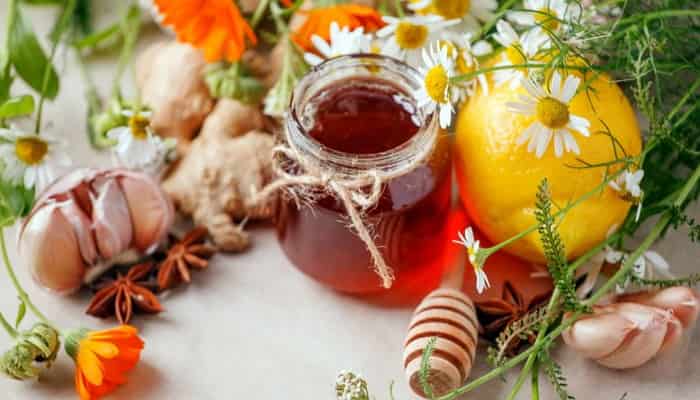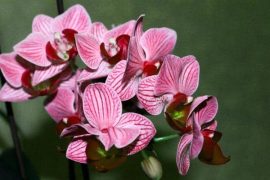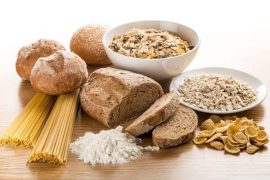Зміст
Cold herbs are a very important category of medicines used to relieve illnesses such as runny nose, cough, fever and sore throat. They are used in adults and children as independent drugs or as an adjunct to therapy with synthetic drugs. Check which herbs should be used for colds?
Herbs and algae
With a sore throat, a runny nose is one of the earliest symptoms of developing colds. It usually starts with a feeling of stuffiness and then gradually takes effect. Popular synthetic media at the moment, but without restrictions, 5–7 days ago. There are many products.
The herbs most commonly used for colds and runny noses are thyme, sage, cloves, mint, chamomile, and rosemary. Also known as: eucalyptus, clove or tea tree oil.
Inhalation involves inhaling the vapors of the freshest extracts, drops, and butter at midday in hot water. This procedure causes instant relief from a runny nose, purifies the air and improves breathing, and is also an alternative way to disinfect indoor air. In addition, oil seed ingredients are also used as herbs to improve blood circulation. Before you start stimulating the blood, perform a warming action. For viral and bacterial infections that can spread, herbal baths for colds.
In addition, if we are struggling with sinusitis, there will be useful herbal mixtures for colds. They contain, for example, verbena herb, elderberry flowers, gentian root, primrose flowers and sorrel herb.
Herbs and mushrooms
The popular herb is popular and popular. Extracts containing antioxidants and antioxidant anthocyanins, organic nutrients and vitamins A, C and B6. Research shows that extracts have the ability to stimulate immune system activity during cramps and are commonly used as a remedy. In the form of extracts rich in flavonoids, the old tradition prevails over infections that are known to persist, causing an anti-inflammatory and mild antipyretic.
To relieve fever from colds and flu, linden inflorescence with a diaphoretic effect or infusions of willow bark and meadow sweet herb, which have antipyretic, analgesic and anti-inflammatory effects, are also useful. Both willow and meadow sweet contain salicylic acid derivatives, so they can only be consumed by adults.
Herbs that have a vitamin-strengthening effect are also good for colds, for example, black currant fruits, raspberries and choke berry fruits, which is also considered a herb for lowering blood pressure. In juice form, they are an excellent addition to warming herbal teas for colds.
Herbs for colds during pregnancy that are safe to use include: black currant, ginger, and garlic. However, the latter should be taken in moderation, as excessive amounts can cause stomach irritation and flatulence.
Herbs for colds and coughs
The cough that accompanies a cold is usually dry in the initial stage, that is, unproductive. To relieve this type of cough, it is recommended to use herbal preparations that protect, soothe and moisturize the upper respiratory tract. The mucus they contain reduces irritation of cough receptors and thereby weakens the cough reflex. Raw materials with this effect are marshmallow root and leaf, plantain leaf, colt’s foot leaf, Icelandic lichen and black mallow flowers.
Mallow is an exceptional herb for menopause, but due to its estrogenic effects, it is not recommended for use during pregnancy and breastfeeding.
In turn, herbs for wet coughs that appear in the second phase of the disease are primarily plants with expectorant properties, rich in saponin compounds or essential oils: ivy, anise, mullein, primrose, thyme and licorice, classified as herbs for libido. One of the most popular herbs for productive coughs, used for generations, is thyme. It is extremely valuable for colds, including due to its disinfectant effect, and is also used as one of the herbs against parasites. Most herbal cough medicines available in pharmacies come in the form of syrups, although they can also be made into infusions.
Herbs for children against colds
Herbal teas for colds can also be used for children. From the first days of life, gentle chamomile infusions are recommended for the youngest children, as they have anti-inflammatory and antispasmodic properties, so they are used to relieving colic in infants. Chamomile is also one of the most valuable herbs for skin problems, as long as it does not cause allergies.
Infusions of linden flowers and raspberry fruits are especially useful for preschool children. Their use for colds relieves coughs and reduces fever. One more n valuable drug is onion syrup, which can be easily prepared at home. It is an effective cough suppressant, and the sulfur compounds contained in onions have an antiseptic effect.
It is also worth noting that herbs for coughs and runny noses in children are widely used in the production of complex syrups that alleviate the symptoms of colds. The composition of preparations of this type includes, among other things: extracts of the herb verbena and African geranium, elderberry, acerola or mullein flower extracts.








